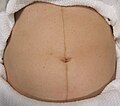During pregnancy, a baby developing inside the womb receives all its nutrition from its mother. Inadequate dietary intake during pregnancy can lead to malnutrition and poor outcomes for the baby. Therefore, advising women on their diet and providing food supplements in pregnancy may help babies to grow and thrive.
This review includes 17 randomised controlled trials, involving 9030 women. The quality of the included trials is low to moderate. We, examined several aspects of dietary advice and supplementation and produced the following four main findings.
(1) Providing nutritional advice resulted in an increase in the mother's protein intake, there were fewer babies born too early (two trials involving 449 women) and fewer babies with low birthweight (one trial involving 300 women), One study of 389 women showed increases in some babies birth head circumference (in one trial involving 389 women) There were also more babies with a higher birthweight among undernourished women (two trials involving 320 women).
(2) Giving the mothers balanced energy and protein supplements was associated with fewer babies dying during labour (five trials, 3408 women), clear increases in birthweight (11 trials, 5385 women) and fewer babies who were small-for-gestational age (seven trials, 4408 women). However, the impact on the long-term health of the baby was uncertain, including among undernourished women.
(3) High-protein supplementation (one trial involving 1051 women) showed no benefit for women and potential harm for the baby through an increase in the number of babies small for their gestational age at birth.
(4) Isocaloric protein supplementations (i.e. balanced supplements in which the protein replaces an equal quantity of other nutrients, e.g. fat and carbohydrate): in birthweight and weekly gestational weight gain, showed no benefit for women or their babies (two trials involving 184 women).
Providing nutritional advice or balanced energy and protein supplements to women during pregnancy may be beneficial. However, there is not enough evidence on isocaloric protein supplements which currently appear to be unhelpful and high-protein supplements may be harmful.
Authors' conclusions:
This review provides encouraging evidence that antenatal nutritional education with the aim of increasing energy and protein intake in the general obstetric population appears to be effective in reducing the risk of preterm birth, low birthweight, increasing head circumference at birth, increasing birthweight among undernourished women, and increasing protein intake. There was no evidence of benefit or adverse effect for any other outcome reported.
